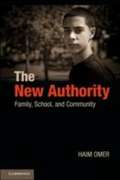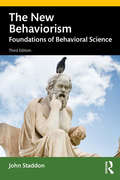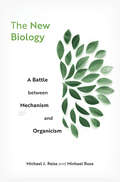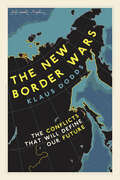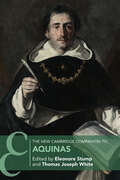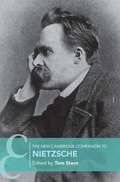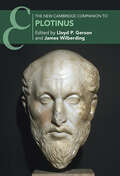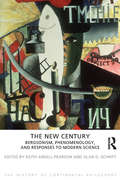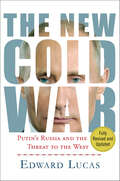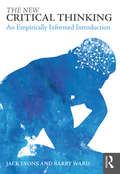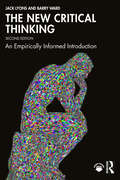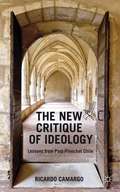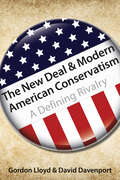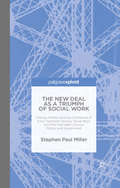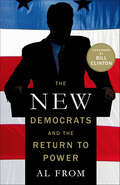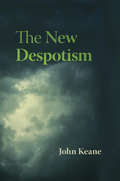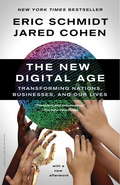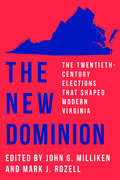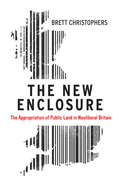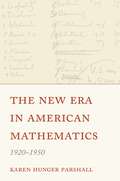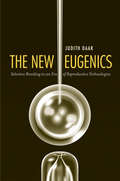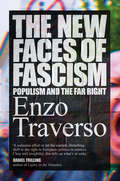- Table View
- List View
The New Authority
by Haim Omer Michal Herbsman Shoshana London SappirHaim Omer builds on his previous work to present a new model of authority for parents, teachers and community workers that is suitable for today's free and pluralistic societies. This new authority contrasts with traditional authority in that it emphasizes self-control and persistence over control of the child, a network of support over a strict hierarchy, taking mutual responsibility for escalations over holding the child solely responsible, patience over threats, non-violent resistance over physical force, and transparency over secrecy. In addition to a thorough discussion of the underlying theory, The New Authority presents a practical program for families, schools and communities. Dr Omer provides specific instructions to combat violence and risky behavior at home and in school, increase parent and teacher interest and support, and implement interventions that increase safety, improve atmosphere and generate community cohesiveness.
The New Authority
by Haim Omer Michal Herbsman Shoshana London SappirHaim Omer builds on his previous work to present a new model of authority for parents, teachers and community workers that is suitable for today's free and pluralistic societies. This new authority contrasts with traditional authority in that it emphasizes self-control and persistence over control of the child, a network of support over a strict hierarchy, taking mutual responsibility for escalations over holding the child solely responsible, patience over threats, non-violent resistance over physical force, and transparency over secrecy. In addition to a thorough discussion of the underlying theory, The New Authority presents a practical program for families, schools and communities. Dr Omer provides specific instructions to combat violence and risky behavior at home and in school, increase parent and teacher interest and support, and implement interventions that increase safety, improve atmosphere and generate community cohesiveness.
The New Behaviorism: Foundations of Behavioral Science
by John StaddonThis ground-breaking book presents a brief history of behaviorism, along with a critical analysis of radical behaviorism, its philosophy and its applications to social issues. This third edition is much expanded and includes a new chapter on experimental method as well as longer sections on the philosophy of behaviorism. It offers experimental and theoretical examples of a new approach to behavioral science. It provides an alternative philosophical and empirical foundation for a psychology that has rather lost its way. The mission of the book is to help steer experimental psychology away from its current undisciplined indulgence in "mental life" toward the core of science, which is an economical description of nature: parsimony, explain much with little. The elementary philosophical distinction between private and public events, even biology, evolution and animal psychology are all ignored by much contemporary cognitive psychology. The failings of radical behaviorism as well as a philosophically defective cognitive psychology point to the need for a new theoretical behaviorism, which can deal with problems such as "consciousness" that have been either ignored, evaded or muddled by existing approaches. This new behaviorism provides a unified framework for the science of behavior that can be applied both to the laboratory and to broader practical issues such as law and punishment, the health-care system, and teaching.
The New Biology: A Battle between Mechanism and Organicism
by Michael Ruse Michael J. ReissIn this accessible analysis, a philosopher and a science educator look at biological theory and society through a synthesis of mechanistic and organicist points of view to best understand the complexity of life and biological systems.The search for a unified framework for biology is as old as Plato’s musings on natural order, which suggested that the universe itself is alive. But in the twentieth century, under the influence of genetics and microbiology, such organicist positions were largely set aside in favor of mechanical reductionism, by which life is explained by the movement of its parts. But can organisms truly be understood in mechanical terms, or do we need to view life from the perspective of whole organisms to make sense of biological complexity?The New Biology argues for the validity of holistic treatments from the perspectives of philosophy, history, and biology and outlines the largely unrecognized undercurrent of organicism that has persisted. Mechanistic biology has been invaluable in understanding a range of biological issues, but Michael Reiss and Michael Ruse contend that reductionism alone cannot answer all our questions about life. Whether we are considering human health, ecology, or the relationship between sex and gender, we need to draw from both organicist and mechanistic frameworks.It’s not always a matter of combining organicist and mechanistic perspectives, Reiss and Ruse argue. There is scope for a range of ways of understanding the complexity of life and biological systems. Organicist and mechanistic approaches are not simply hypotheses to be confirmed or refuted, but rather operate as metaphors for describing a universe of sublime intricacy.
The New Border Wars: The Conflicts That Will Define Our Future
by Klaus DoddsAn enlightening look at contemporary border tensions—from the Gaza Strip to the space race—by one of the world’s leading experts in geopolitics.Border expert Klaus Dodds journeys into the geopolitical clashes of tomorrow in an eye-opening tour of border walls both literal and figurative. In the Himalayas, the Mediterranean, and elsewhere, the tension inherent to trying to divide the world into separate parcels has not gone away. And with climate change shifting our natural borders, from mountains to glaciers to rivers, the question of how we live in a world that’s becoming warmer and wetter and growing in population looms large.With wide-ranging insight and provocative analysis, Dodds shows why we are more likely to see more walls, barriers, and securitization in our daily lives. The New Border Wars examines just what borders truly mean in the modern world: How are they built; what do they signify for citizens and governments; and how do they help us understand our political past and, most importantly, our diplomatic future?
The New Cambridge Companion to Aquinas (Cambridge Companions to Philosophy)
by Eleonore Stump Thomas Joseph WhiteThis new Companion to Aquinas features entirely new chapters written by internationally recognized experts in the field. It shows the power of Aquinas's philosophical thought and transmits the worldview which he inherited, developed, altered, and argued for, while at the same time revealing to contemporary philosophers the strong connections which there are between Aquinas's interests and views and their own. Its five sections cover the life and works of Aquinas; his metaphysics, including his understanding of the ultimate foundations of reality; his metaethics and ethics, including his virtue ethics; his account of human nature; his theory of the afterlife; his epistemology and his theory of the intellectual virtues; his view of the nature of free will and the relation of grace to free will; and finally some key components of his philosophical theology, including the incarnation and atonement, Christology, and the nature of original sin.
The New Cambridge Companion to Nietzsche (Cambridge Companions to Philosophy)
by Tom SternFriedrich Nietzsche (1844–1900) remains one of the most challenging, influential and controversial figures in the history of philosophy. The New Cambridge Companion to Nietzsche provides a comprehensive and up-to-date guide to his most difficult ideas, including the will to power and the affirmation of life, as well as his treatment of truth, science, art and history. An accessible introduction sets out the nineteenth-century background of Nietzsche's life and work. Individual chapters are devoted to significant texts such as The Birth of Tragedy, Thus Spoke Zarathustra, Beyond Good and Evil and On the Genealogy of Morality. Other chapters explore major influences such as Wagner and Schopenhauer, as well as examining Nietzsche's reception and investigating his enduring and often divisive legacy. The volume will be valuable for readers seeking to enhance their understanding of Nietzsche's philosophy and of his role in the development of Western thought.
The New Cambridge Companion to Plotinus (Cambridge Companions to Philosophy)
by Lloyd P. Gerson James WilberdingPlotinus stands at a crossroads in ancient philosophy, between the more than 600 years of philosophy that came before him and the new Platonic tradition. He was the first and perhaps the greatest systematizer of Plato's thought, and all later students of Plato in the following centuries approached Plato through him. This Companion from a new generation of ancient philosophy scholars reflects the current state of research on Plotinus, with chapters on topics including mathematics, fate and determinism, happiness, the theory of forms, categories of reality, matter and evil, and Plotinus' legacy. The volume offers an accessible overview of the thought of one of the pivotal figures in the history of philosophy, and reveals his importance as a thinker whose impact goes far beyond his importance as an interpreter of Plato.
The New Century: Bergsonism, Phenomenology and Responses to Modern Science (The History of Continental Philosophy)
by Keith Ansell-Pearson Alan D. SchriftThis volume covers the period between the 1890s and 1930s, a period that witnessed revolutions in the arts and society which set the agenda for the rest of the century. In philosophy, the period saw the birth of analytic philosophy, the development of new programmes and new modes of inquiry, the emergence of phenomenology as a new rigorous science, the birth of Freudian psychoanalysis, and the maturing of the discipline of sociology. This period saw the most influential work of a remarkable series of thinkers who reviewed, evaluated and transformed 19th-century thought. A generation of thinkers - among them, Henri Bergson, Emile Durkheim, Sigmund Freud, Martin Heidegger, Edmund Husserl, Karl Jaspers, Max Scheler, and Ludwig Wittgenstein - completed the disenchantment of the world and sought a new re-enchantment.
The New Cold War: Putin's Russia and the Threat to the West
by Edward LucasThe first edition of The New Cold War was published to great critical acclaim. Edward Lucas has established himself as a top expert in the field, appearing on numerous programs, including Lou Dobbs, MSNBC, NBC Nightly News, CNN, and NPR. Since TheNew Cold War was first published in February 2008, Russia has become more authoritarian and corrupt, its institutions are weaker, and reforms have fizzled. In this revised and updated third edition, Lucas includes a new preface on the Crimean crisis, including analysis of the dismemberment of Ukraine, and a look at the devastating effects it may have from bloodshed to economic losses. Lucas reveals the asymmetrical relationship between Russia and the West, a result of the fact that Russia is prepared to use armed force whenever necessary, while the West is not. Hard-hitting and powerful, The New Cold War is a sobering look at Russia's current aggression and what it means for the world.This edition includes 30% updated material. It is also fully updated to include an incisive analysis of the Crimean crisis, from Russia's seizure of the region to the dismemberment of Ukraine.
The New Critical Thinking: An Empirically Informed Introduction
by Jack Lyons Barry Ward<p>Why is it so hard to learn critical thinking skills? <p>Traditional textbooks focus almost exclusively on logic and fallacious reasoning, ignoring two crucial problems. As psychologists have demonstrated recently, many of our mistakes are not caused by formal reasoning gone awry, but by our bypassing it completely. We instead favor more comfortable, but often unreliable, intuitive methods. Second, the evaluation of premises is of fundamental importance, especially in this era of fake news and politicized science. <p>This highly innovative text is psychologically informed, both in its diagnosis of inferential errors, and in teaching students how to watch out for and work around their natural intellectual blind spots. It also incorporates insights from epistemology and philosophy of science that are indispensable for learning how to evaluate premises. The result is a hands-on primer for real world critical thinking. The authors bring over four combined decades of classroom experience and a fresh approach to the traditional challenges of a critical thinking course: effectively explaining the nature of validity, assessing deductive arguments, reconstructing, identifying and diagramming arguments, and causal and probabilistic inference. Additionally, they discuss in detail, important, frequently neglected topics, including testimony, the nature and credibility of science, rhetoric, and dialectical argumentation. <p>Key Features and Benefits: <p> <li>Uses contemporary psychological explanations of, and remedies for, pervasive errors in belief formation. There is no other critical thinking text that generally applies this psychological approach. <li>Assesses premises, notably premises based on the testimony of others, and evaluation of news and other information sources. No other critical thinking textbook gives detailed treatment of this crucial topic. Typically, they only provide a few remarks about when to accept expert opinion / argument from authority. <li>Carefully explains the concept of validity, paying particular attention in distinguishing logical possibility from other species of possibility, and demonstrates how we may mistakenly judge invalid arguments as valid because of belief bias. <li>Instead of assessing an argument’s validity using formal/mathematical methods (i.e., truth tables for propositional logic and Venn diagrams for categorical logic), provides one technique that is generally applicable: explicitly showing that it is impossible to make the conclusion false and the premises true together. For instructors who like the more formal approach, the text also includes standard treatments using truth tables and Venn diagrams. <li>Uses frequency trees and the frequency approach to probability more generally, a simple method for understanding and evaluating quite complex probabilistic information <li>Uses arguments maps, which have been shown to significantly improve students’ reasoning and argument evaluation</li></p>
The New Critical Thinking: An Empirically Informed Introduction
by Jack Lyons Barry WardThis book aims to improve real-world critical thinking.Traditional critical thinking texts neglect two crucial facts. First, as psychologists have shown, many of our mistakes are caused not by faulty formal reasoning but because we bypass it in favor of intuitive, often unreliable heuristics. Second, good critical thinking requires not only the proper assessment of inference but also of our premises: the evaluation of information sources is of fundamental importance, especially in this internet era of fake news and politicized science.This highly innovative text is psychologically informed, both in its diagnosis of inferential errors and in teaching students how to watch out for, and circumnavigate, their natural intellectual blind spots. It also incorporates insights from epistemology and philosophy of science to formulate best practices for assessing information sources on the internet and other media. The result is a practical, hands-on primer for real-world critical thinking.The authors bring more than five combined decades of classroom experience to the subject, covering the usual core topics of deductive, inductive, causal, and probabilistic inference, argument identification, reconstruction, and diagramming, while also extending the text’s scope to include testimony, the nature and credibility of science, rhetoric, and dialectical argumentation.The Second Edition further develops and refines these innovations, combining in-depth discussion of “fake news” and conspiracy theories with exercises and projects designed to teach broadly applicable source assessment skills. There is also a more nuanced positive account of science that emphasizes its continuity with commonsense causal reasoning. For instructors, there are additional online resources, notably banks of exam questions with solutions and various class projects.Key Features: Uses contemporary psychological explanations and remedies for pervasive errors in belief formation. No other critical thinking text generally applies this psychological approach Rigorously addresses the evaluation of premises based on testimony, in particular the testimony of internet sources Carefully explains the concept of validity, paying particular attention to distinguishing logical possibility from other species of possibility Uses frequency trees as a simple and reliable alternative to more complicated Bayesian methods Uses arguments maps, which improve students’ reasoning and argument evaluation Key Updates to the Second Edition: Expanded discussion of the psychology of reasoning and belief, including treatment of motivated reasoning Uses a conventional truth-table–based approach to propositional logic while incorporating a more intuitive, psychologically informed approach to the logic of conditionals New Summary Boxes Enhanced treatment of testimony, with an expanded discussion of fake news, conspiracy theories, and the application of general epistemic principles to navigate the extremes of gullibility and unmotivated skepticism. New exercises that emphasize practical, hands-on source assessment skills An improved discussion of the nature of science emphasizing the central role of causal inference and the multi-generational, cumulative character of scientific knowledge A new Index of Arguments, summarizing the most common argument forms and associated defeaters for the inductive forms New online content, including exams and additional questions (plus solutions), suitable for upload to course management software (e.g., Blackboard, etc.) For online resources suitable for students and instructors, please see the appropriate link on the book’s Routledge web page: www.routledge.com/9781032317281
The New Critique of Ideology
by Ricardo CamargoThis book offers a new ideology critique for political analysis by revisiting Habermas via a Žižekian reading. The book includes an application of the theory to the case of the political consensus reached in Chile's post-Pinochet.
The New Deal & Modern American Conservatism: A Defining Rivalry
by Gordon Lloyd David DavenportProviding an often-overlooked historical perspective, Gordon Lloyd and David Davenport show how the New Deal of the 1930s established the framework for today's U.S. domestic policy and the ongoing debate between progressives and conservatives. They examine the pivotal issues of the dispute, laying out the progressive-conservative arguments between Hoover and Roosevelt in the 1930s and illustrating how those issues remain current in public policy today. The authors detail how Hoover, alarmed by the excesses of the New Deal, pointed to the ideas that would constitute modern U.S. conservatism and how three pillars—liberty, limited government, and constitutionalism—formed his case against the New Deal and, in turn, became the underlying philosophy of conservatism today. Illustrating how the debates between Franklin Roosevelt and Herbert Hoover were conducted much like the campaign rhetoric of liberals and conservatives in 2012, Lloyd and Davenport assert that conservatives must, to be a viable part of the national conversation, “go back to come back”—because our history contains signposts for the way forward.
The New Deal as a Triumph of Social Work: Frances Perkins and the Confluence of Early Twentieth Century Social Work with Mid-Twentieth Century Politics and Government
by S. MillerThe New Deal as a Triumph of Social Work concerns the 'hand' the New Deal plays from the perspective of early American History in which government and business cooperation is assumed and economic rights are addressed collectively whereas political rights are considered individually. The New Deal reconfigures this 'ratio' of rights by folding 'social work' into the aims of government. Miller describes the vital part Frances Perkins and her personal history play in this development.
The New Democrats and the Return to Power
by Al FromAfter Barack Obama's solid win in the 2012 election, it's easy to forget that there was a time, not long ago, when the Democrats were shut out of power for over a decade. But Al From remembers. In 1984, he led a small band of governors, US senators, and members of Congress to organize the Democratic Leadership Council (DLC). Their mission: to rescue the party from the political wilderness, redefine its message, and, most importantly, win presidential elections. In April 1989, From traveled to Little Rock, Arkansas, to recruit the state's young governor, Bill Clinton, to be chairman of the DLC. Here, Al From explores the founding philosophy of the New Democrats, which not only achieved stunning validation during Clinton's two terms, but also became the model for resurgent center-left parties in Europe and throughout the democratic world. Here, he outlines for the first time the principles at the heart of the movement, including economic centrism, national security, and entitlement reform, and why they are vital to the success of the Democratic Party in the years ahead.
The New Despotism
by John KeaneA disturbing in-depth exposé of the antidemocratic practices of despotic governments now sweeping the world. One day they’ll be like us. That was once the West’s complacent and self-regarding assumption about countries emerging from poverty, imperial rule, or communism. But many have hardened into something very different from liberal democracy: what the eminent political thinker John Keane describes as a new form of despotism. And one day, he warns, we may be more like them. Drawing on extensive travels, interviews, and a lifetime of thinking about democracy and its enemies, Keane shows how governments from Russia and China through Central Asia to the Middle East and Europe have mastered a formidable combination of political tools that threaten the established ideals and practices of power-sharing democracy. They mobilize the rhetoric of democracy and win public support for workable forms of government based on patronage, dark money, steady economic growth, sophisticated media controls, strangled judiciaries, dragnet surveillance, and selective violence against their opponents. Casting doubt on such fashionable terms as dictatorship, autocracy, fascism, and authoritarianism, Keane makes a case for retrieving and refurbishing the old term “despotism” to make sense of how these regimes function and endure. He shows how they cooperate regionally and globally and draw strength from each other’s resources while breeding global anxieties and threatening the values and institutions of democracy. Like Montesquieu in the eighteenth century, Keane stresses the willing complicity of comfortable citizens in all these trends. And, like Montesquieu, he worries that the practices of despotism are closer to home than we care to admit.
The New Digital Age: Reshaping the Future of People, Nations and Business
by Eric Schmidt Jared CohenIn an unparalleled collaboration, two leading global thinkers in technology and foreign affairs give us their widely anticipated, transformational vision of the future: a world where everyone is connected--a world full of challenges and benefits that are ours to meet and to harness. Eric Schmidt is one of Silicon Valley's great leaders, having taken Google from a small startup to one of the world's most influential companies. Jared Cohen is the director of Google Ideas and a former adviser to secretaries of state Condoleezza Rice and Hillary Clinton. With their combined knowledge and experiences, the authors are uniquely positioned to take on some of the toughest questions about our future: Who will be more powerful in the future, the citizen or the state? Will technology make terrorism easier or harder to carry out? What is the relationship between privacy and security, and how much will we have to give up to be part of the new digital age? In this groundbreaking book, Schmidt and Cohen combine observation and insight to outline the promise and peril awaiting us in the coming decades. At once pragmatic and inspirational, this is a forward-thinking account of where our world is headed and what this means for people, states and businesses. With the confidence and clarity of visionaries, Schmidt and Cohen illustrate just how much we have to look forward to--and beware of--as the greatest information and technology revolution in human history continues to evolve. On individual, community and state levels, across every geographical and socioeconomic spectrum, they reveal the dramatic developments--good and bad--that will transform both our everyday lives and our understanding of self and society, as technology advances and our virtual identities become more and more fundamentally real. As Schmidt and Cohen's nuanced vision of the near future unfolds, an urban professional takes his driverless car to work, attends meetings via hologram and dispenses housekeeping robots by voice; a Congolese fisherwoman uses her smart phone to monitor market demand and coordinate sales (saving on costly refrigeration and preventing overfishing); the potential arises for "virtual statehood" and "Internet asylum" to liberate political dissidents and oppressed minorities, but also for tech-savvy autocracies (and perhaps democracies) to exploit their citizens' mobile devices for ever more ubiquitous surveillance. Along the way, we meet a cadre of international figures--including Julian Assange--who explain their own visions of our technology-saturated future. Inspiring, provocative and absorbing, The New Digital Age is a brilliant analysis of how our hyper-connected world will soon look, from two of our most prescient and informed public thinkers.
The New Dominion: The Twentieth-Century Elections That Shaped Modern Virginia
by Mark J. Rozell John G. MillikenThe New Dominion analyzes six key statewide elections to explore the demographic, cultural, and economic changes that drove the transformation of the state’s politics and shaped the political Virginia of today. Countering the common narrative that the shifting politics of Virginia is a recent phenomenon driven by population growth in the urban corridor, the contributors to this volume consider the antecedents to the rise of Virginia as a two-party competitive state in the critical elections of the twentieth century that they profile.
The New Enclosure: The Appropriation of Public Land in Neoliberal Britain
by Brett ChristophersHow public land has been stolen from us.Much has been written about Britain's trailblazing post-1970s privatization program, but the biggest privatization of them all has until now escaped scrutiny: the privatization of land. Since Margaret Thatcher took power in 1979, and hidden from the public eye, about 10 per cent of the entire British land mass, including some of its most valuable real estate, has passed from public to private hands. Forest land, defence land, health service land and above all else local authority land- for farming and school sports, for recreation and housing - has been sold off en masse. Why? How? And with what social, economic and political consequences? The New Enclosure provides the first ever study of this profoundly significant phenomenon, situating it as a centrepiece of neoliberalism in Britain and as a successor programme to the original eighteenth-century enclosures. With more public land still slated for disposal, the book identifies the stakes and asks what, if anything, can and should be done.
The New England Transcendentalists: Life of the Mind and of the Spirit (Perspectives On History Series)
by Ellen HansenAlong with excerpts from widely known writers, the vivid recollections of a girl and of a boy who had been students at Brook Farm School present an enlightening glimpse of the Transcendentalist philosophy. In addition to the essay by contemporary historian, Ellen Hansen, the book includes excerpts from the works of Ralph Waldo Emerson, Henry David Thoreau, Margaret Fuller, Walt Whitman, Octavius Brooks Frothingham, Kate Sloan Gaskill, and Arthur Sumner.
The New Era in American Mathematics, 1920–1950
by Karen Hunger ParshallA meticulously researched history on the development of American mathematics in the three decades following World War IAs the Roaring Twenties lurched into the Great Depression, to be followed by the scourge of Nazi Germany and World War II, American mathematicians pursued their research, positioned themselves collectively within American science, and rose to global mathematical hegemony. How did they do it? The New Era in American Mathematics, 1920–1950 explores the institutional, financial, social, and political forces that shaped and supported this community in the first half of the twentieth century. In doing so, Karen Hunger Parshall debunks the widely held view that American mathematics only thrived after European émigrés fled to the shores of the United States.Drawing from extensive archival and primary-source research, Parshall uncovers the key players in American mathematics who worked together to effect change and she looks at their research output over the course of three decades. She highlights the educational, professional, philanthropic, and governmental entities that bolstered progress. And she uncovers the strategies implemented by American mathematicians in their quest for the advancement of knowledge. Throughout, she considers how geopolitical circumstances shifted the course of the discipline.Examining how the American mathematical community asserted itself on the international stage, The New Era in American Mathematics, 1920–1950 shows the way one nation became the focal point for the field.
The New Eugenics: Selective Breeding in an Era of Reproductive Technologies
by Prof. Judith DaarA provocative examination of how unequal access to reproductive technology replays the sins of the eugenics movement Eugenics, the effort to improve the human species by inhibiting reproduction of "inferior" genetic strains, ultimately came to be regarded as the great shame of the Progressive movement. Judith Daar, a prominent expert on the intersection of law and medicine, argues that current attitudes toward the potential users of modern assisted reproductive technologies threaten to replicate eugenics' same discriminatory practices. In this book, Daar asserts how barriers that block certain people's access to reproductive technologies are often founded on biases rooted in notions of class, race, and marital status. As a result, poor, minority, unmarried, disabled, and LGBT individuals are denied technologies available to well-off nonminority heterosexual applicants. An original argument on a highly emotional and important issue, this work offers a surprising departure from more familiar arguments on the issue as it warns physicians, government agencies, and the general public against repeating the mistakes of the past.
The New Existentialism
by Colin WilsonWilson's new existentialism is an attempt to show how recent developments in understanding of consciousness provides 20th and 21st century man with a relevant and sastisfying philosophy.
The New Faces of Fascism: Populism and the Far Right
by Enzo TraversoWhat is fascism in the twenty first century?What does Fascism mean at the beginning of the twenty-first century? When we pronounce this word, our memory goes back to the years between the two world wars and envisions a dark landscape of violence, dictatorships, and genocide. These images spontaneously surface in the face of the rise of radical right, racism, xenophobia, islamophobia and terrorism, the last of which is often depicted as a form of "Islamic fascism." Beyond some superficial analogies, however, all these contemporary tendencies reveal many differences from historical fascism, probably greater than their affinities. Paradoxically, the fear of terrorism nourishes the populist and racist rights, with Marine Le Pen in France or Donald Trump in the US claiming to be the most effective ramparts against "Jihadist fascism". But since fascism was a product of imperialism, can we define as fascist a terrorist movement whose main target is Western domination? Disentangling these contradictory threads, Enzo Traverso's historical gaze helps to decipher the enigmas of the present. He suggests the concept of post-fascism--a hybrid phenomenon, neither the reproduction of old fascism nor something completely different--to define a set of heterogeneous and transitional movements, suspended between an accomplished past still haunting our memories and an unknown future.

